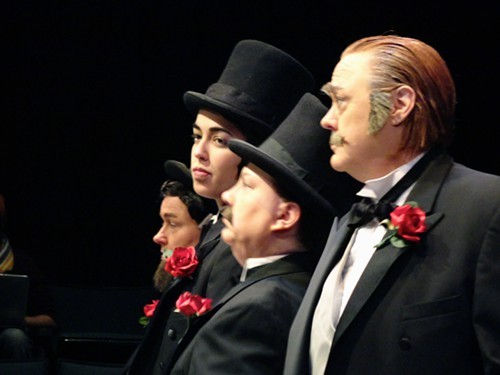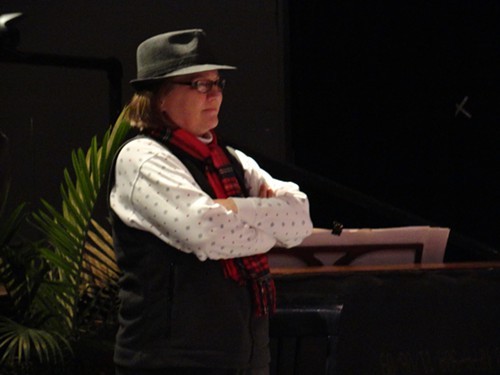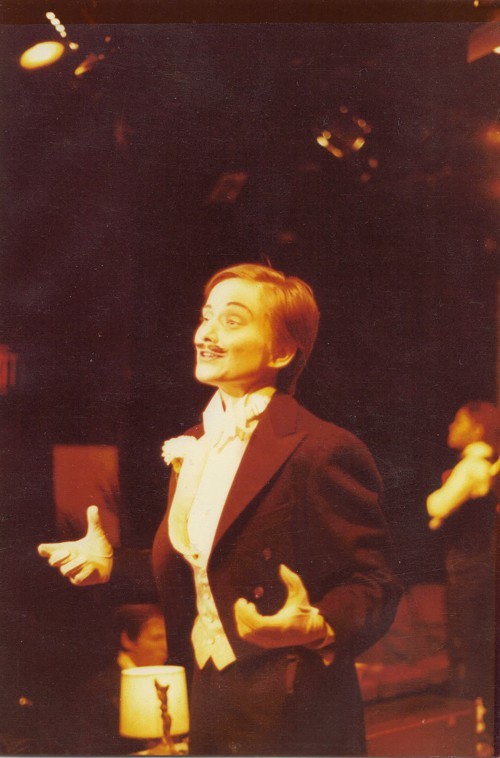In uncertain times, there is one thing I know for sure: I am grateful to every god, devil, and hero in the combined pantheon of global myth that I’m not Sylvia Wilson, the stage manager for the New Moon Theatre Company’s ambitious and strongly acted production of Tracy Letts’ horror/drama Bug. The ridiculous mess of fake gasoline and bodily fluids left onstage at the end of every show has to be spirit-breaking. Bottles are strewn from one end of the theater to the other amid rumpled bedding, multiple insecticide containers, and bits of aluminum foil. The floor is slick with god knows what but still never as messy as the lives of Letts’ broken characters.
Bug is hardcore pulp and a special treat for anybody who ever stayed up late to hear the guests on Art Bell’s syndicated Coast-to-Coast radio show weave every conspiracy that ever existed about shadow governments and aliens into a crazy fabric of alternative space-time. It’s a grotesque love story about an intermittently stable woman with no self-worth and a charismatic but dangerously paranoid Gulf War veteran, who may be but probably isn’t the parasite-infested end-result of a mad government experiment gone south. These characters are hard cases: intelligent but isolated, sick, ignorant, deep into their booze, and hopeless from lights up.
Director Gene Elliot’s production is action-packed. His sound design, which consists mostly of Tejano music and helicopters, is managed in such a way that it projects the characters’ disorientation and drugged-up paranoia onto the audience. Bug won’t be everybody’s bucket of guts. It’s also one heckuva showcase for all of the artists involved.
When it comes to bad taste in men, Agnes (Tracie Hansom) deserves some kind of prize. She’s sandwiched between Goss (Greg Boller), her hyper-macho ex, who’s fresh out of jail and doesn’t give a damn about consensual, and Peter (John Dylan Atkins) who’s more sensitive and ultimately more dangerous. The more she falls for Peter, adopting his paranoid vision of the world, the more she tears at her own skin to get the parasites out.
“I’m not an ax murderer,” Peter says early on, telegraphing to everybody who’s ever picked up a trashy novel that he must be some other kind of murderer. Or he soon will be.
Letts revels in druggy, voyeuristic excess, and gore hounds and Halloween thrill seekers with the patience to make it to the end of this talky psychodrama will get their share of the ultra-violence.
Kell Christie, last seen in the New Moon’s King Lear, takes on R.C., a tough, coke-snorting lesbian who tries to help Agnes. Jim Palmer, a veteran of Letts’ better known August: Osage County at Playhouse on the Square, is superb in his walk-on role as Dr. Sweet, a psychiatrist who may or may not confirm all of Peter’s buggy suspicions.
At TheatreWorks through November 4th.
Germantown Community Theatre’s gone out on a limb to produce Twilight of the Gods. The new work by Wes Driver and Greg Greene of Nashville’s Blackbird Theater hasn’t played in New York or Chicago and doesn’t come with much name recognition. That hardly seems to matter judging by the packed house and appreciative response to Sunday’s matinee.
Twilight of the Gods is a literate murder mystery that parodies literate murder mysteries.
The plot is anything but tight, and the style careens wildly between satire and broad sketch comedy. But the writing is snappy, the slapstick is good, and where else will you find Emily Dickinson, H.G. Wells, Edgar Allan Poe, Mark Twain, Arthur Conan Doyle, Rasputin, Annie Oakley, Jack the Ripper, Houdini, Friedrich Nietzsche and Christian Science founder, Mary Baker Eddy, all gathered together in one room for the purpose of global domination and/or a bloody game of shoot and stab?
A top-shelf cast includes James Dale Green, Emily Chateau, Brent Davis, Rob Hanford, and Greg Krosnes and gets big laughs with smart gallows humor.
One complaint, though. Rasputin the Mad Monk is famous for being hard to kill. It’s disappointing that he didn’t shake himself back to life at the very end for a final epic battle pitting evil against another, completely different kind of evil.
At Germantown Community Theatre through November 11th.




